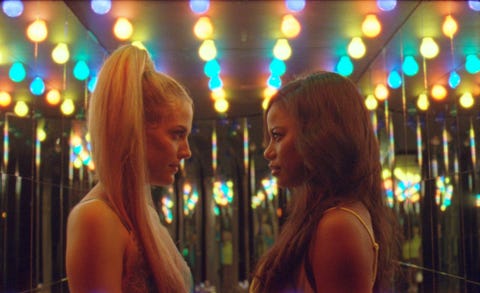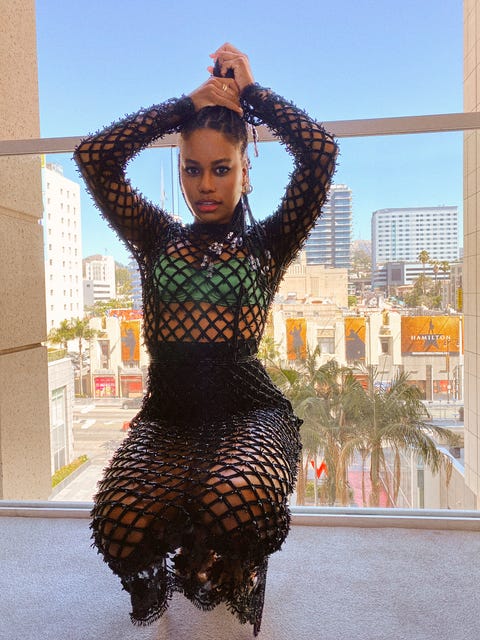No question, 2020 has been a rough year for pretty much everyone, but the tail end of August was particularly terrible for Taylour Paige. When we connect over Zoom, just three
days after the world learned her Ma Rainey’s Black Bottom co-star Chadwick Boseman had died of colon cancer, Paige, understandably, is not quite sure how to respond when asked how she’s doing. “Lordy,” she says. “Let’s take a deep breath together.”
In Ma Rainey's Black Bottom, based on the August Wilson play and streaming now on Netflix, Paige plays Dussie Mae, the titular blueswoman’s lover who's also caught the eye of Levee, an ambitious trumpeter played by Boseman. Dussie Mae and Levee are connected by a quest for freedom, Paige says, and so were the humans who played them. “He gave the cast gifts when we wrapped, and in my letter, he wrote, ‘May you find prosperity in your freedom,’” she recalls.
Next summer, audiences will (finally) get to see Paige as the title character in Zola, Janicza Bravo’s highly anticipated film based on an epic Twitter thread about a wild road trip two strippers took to Florida. Last week, A24 announced its release date with a cheeky reply to a Twitter user asking about Joe Biden’s plan to release the film: “We did it, Joe. #Zola in theaters 6/30/21.”
Zola and Ma Rainey’s Black Bottom are “completely different,” Paige says, but she doesn’t think she would've been able to play Dussie had she not played Zola first. “Zola and Dussie both, regardless of their environment, have a sense of integrity as to who they are. Either it’s, ‘This is who I am, and I’m not doing that,’ with Zola, or ‘This is who I am, and I am,’ with Dussie.” Read on for more from Paige about how she gets into character and the one thing that makes her cry tears of joy—despite everything.
I’m so sorry about Chadwick. What is your most treasured memory of working with him?
Every time Chadwick spoke, he had something to say. I know that sounds really oversimplified, but he just spoke with such discipline and intentionality. He was also pure and gentle and asked really interesting questions. He was curious and, you know, one of us. Of course, you retrace your steps because now you know he was sick. And in the beginning, he [kept] to himself a bit more, and with his people. But by the time we worked together—we had a whole day together—we were so playful. There’s a scene when my skirt goes up, and it was just fun, and he was just…beautiful. I felt so thankful at the end of the day. I was like, Thank you so much for allowing me to play. We had these moments, where I’m looking at him and he’s looking at me, and he’s like, “I’m gonna try it this way,” and I’m like, “Whatever you want.” It felt like we were holding each other’s hands symbolically. I feel like he should win an Oscar just for acting like he was okay.

You play Ma Rainey’s lover, but your character has a thing with Levee.
Yes, they’re naughty. They have a little thing in the basement while the band is rehearsing, but we have chemistry throughout. We see each other. Both of our characters are on the quest for freedom, and that’s essentially why they see each other. They’re trying to get out, trying to live in their truth in a time where the world doesn’t accept them because they’re Black.
Are there any parallels to be drawn between Dussie Mae and Zola—maybe in how both women are familiar with the power of their beauty and sensuality?
I think I wouldn’t have been able to play Dussie had I not played Zola. The sense of agency that I had to surrender to be Zola—for me, personally, I was beginning my Saturn return, and I was at the pinnacle of tough times but also stepping into who I really wanted to be, and letting, you know, the ghetto 20s drift away. I knew that to be Zola I had to stop apologizing for my space. To play this beautiful force, I had to own it. Throughout my life, I’ve always been someone who, when I receive a compliment, I’m like ‘No,’ or make it a joke. And Zola—Aziah—knows who she is and celebrates that. With Dussie, she’s aware that the way people receive her is that she’s unaware, but that’s kind of her superpower. She’s like, Oh, you guys think I don’t see, but I’m actually an engaged observer, and I’m learning from all of you, and I’m definitely getting out of this situation. I’m gonna be free. I’m gonna find my way.
Have you met Aziah Wells, the writer of the Twitter thread?
She’s like my sister. We lean on each other to this day. Janicza and I always joke that [Aziah and I] must have done a past life together because we’re so divinely connected. Both of our cars broke down at the same time—weird life things were happening to both of us at the same time. I was in this weird in-between space in my personal life [when I first heard about the film]. I was like, what stories do I want to tell, and why am I telling them? There are a limited amount of scripts for a Black girl my age for things I actually care about. It’s getting better, but it’s a slow journey. And in being particular and intentional about what stories I want to tell, there have been times where I’ve been broke or in-between and I go back to working at the weed dispensary or this cool streetwear store or teaching kids acting or cleaning houses. I would much rather do that than some silly pilot about cops.
Had you seen the original Zola Twitter thread as it was happening?
I didn’t see it in real-time—I’m not really active on Twitter. But she’s an icon. The way she writes, I put her up there with, like, Toni Morrison. There’s so much imagery and description and the voices—it’s a very clear voice. When I first became aware of the script, it was very sexist and racist. I was like, “Eh, I don’t know. The script just doesn’t sound like this girl.” I still did a tape, and my agent was like, ‘Come on, it’s probably going to go to Sundance. We need this.” My agents are my family, but sometimes it’s like, you’re just pushing me to do this thing, and I’m fine not working right now even though I’m broke as hell. But she was like, “Just do the tape.” So I do the tape, and they were like, “Whoa this is really, really good.” But then the project went away. And then I got the Hustlers script, and I read it, and I was like, okay, it’s based on a true story, it’s about strippers…what happened with Zola? And my agent was like, “well it’s coming back, but you didn’t like it.” But by then I was in a different place and wanted to give it new eyes. She was like, “Well okay, there’s actually a new director and writer attached.” And I’m like, “Well, that’s important information!”
So I read it, and it’s fantastic. And I do the tape again, and I go in and get a callback, and now I’m talking to Aziah through Instagram, and she’s like, “You’re so me, it hurts. I’m not taking no for an answer. Bitch, no one deserves this more than us.” She was super supportive, and I felt really good that I had her blessing. When I found out I did get it, her mom reached out and was like, “We loved you, we were rooting for you, we’re so happy.”

That’s amazing. Did you and Riley Keough bond on set? I read that you saw a shooting star together.
To this day, I’ve seen three shooting stars in my life. One with my boyfriend, and two with Riley in Florida. Right away, she was like, “You speak my language.” We just get each other. She really is my best friend. We lean on each other a lot. We both feel like we’re still figuring out how to surrender to being in these bodies. I’ve never had someone have the right language to explain how it is that I’m feeling at times, because, not to get all esoteric and weird, but I can’t go many hours in a day without thinking about what the hell we’re all doing here. Like, what is this place? It’s just so bizarre. It’s a beautiful world, but it’s like we’re in purgatory, this great in-between.
Both Riley and I, the only way we make sense of it is by empathizing with the people we play. And in our real lives, just trying to be. We’re both air signs. We’re both in the clouds. We call each other balloons. That girl is really special. I just love her so much, and she’s had a very hard year.
"I’m still figuring out everything I am not, so I can be who I actually am."
When I first saw Zola, I didn’t know you had a background in dance, and I was really impressed by your skills.
Thank you so much! Dancing was my first love. I was put into dance early [at age 2] because I was always moving around and a very ratchet and ADHD child. I’d hear ‘sit down!’ and then do a cartwheel. So it was like, ‘put this child somewhere.’ I was always making up dances with my cousins, but I spent a lot of time alone because my brother was eight years older than me, and my sense of escapism was creating a world and doing cartwheels and jumping off the garage. I was one of those kids who was like, “Look at me!”
But I started taking it seriously at 12 because that’s when my mom’s best friend, who was on Broadway, told me about a new dance studio run by Debbie Allen. I auditioned and received a scholarship, and Ms. Allen took me under her wing. I went to Italy with her when I was 13. I went to the Kennedy Center with her for three months when I was 15. She kind of saved me in a big way.
How did you make the transition from dance to acting?
I was 14 and doing a musical with Debbie Allen, and she invited this man, Stan Rogow, who produced Lizzie McGuire, to our rehearsal. He asked Ms. Allen, “Who’s the girl in the purple shorts?” And that was me. Shortly after, he became my manager. I was so naïve and green. I didn’t realize that imagination is something you can get paid to do. I know that sounds silly because obviously, I watched television. But I loved writing and storytelling and creating a world that doesn’t exist. I’ve always given my stuffed animals feelings. I would sleep with all of them around me and be uncomfortable so all my stuffed animals were comfortable.

You were also going to Loyola Marymount University, and briefly worked as a Laker Girl.
I was working about two to three jobs the entire time, thinking, “as soon as I book, I’m outta here!” And I regret that. I wish I’d just focused on learning. I love sitting at coffee shops with a notebook and observing people and their mannerisms, and wondering, what is that person thinking? They have a whole life I’ll never know about. I just love and hate humanity.
I was a Laker Girl for three months and hated it. I thought it would be fun because I grew up in a Laker household. My brother would go to Lakers Camp every summer. But it was definitely not for me. I was getting auditions, but I’d have to miss them. I remember we were shooting our calendar, one of those sexy, silly calendars, and we were in the water. I said something to the camera, like, “Bet you wish you were in here!” And the director was like, “You’re not here to be the star. This is not the Taylour show.” It was just sad, dimming that light. But I get it. You’re part of a team. I mean, I am on a team called life, and I do want to help push humanity and consciousness forward. I want to be of service to this planet. I really do. But also, I’m not meant to be on a team.
That sounds awful.
It really was. I used to be embarrassed to talk about it. Blessings to all of those girls and the people who do love it, but that was just not for me. It felt really cruel. But also, I’ve always been someone who wants to paint outside the lines, and that’s not the space for that. I was immature and young, so I quit. A year after that, I got an audition for this television show called Hit the Floor. It was a fictitious show about the lives and loves of basketball dancers. Big learning experience, loved learning, but looking back, I wish I’d gone to New York and done theater and got to know myself, because when you’re 20, 21, 22, 23, you’re still auditioning for your personality. I’m still figuring out everything I am not, so I can be who I actually am. I came to a place on that show where I was like, “Okay, I love these people I work with, but what is the story I’m telling? Why am I telling it?” And I started having that kind of existential crisis, like, “Oh no, does this mean anything? What does this matter? Basketball lives? I got away from that in my real life!” There’s only so much expanding one can do. So after the third season, I left. And then I did this little indie film and became really intentional about storytelling and wanting to be challenged, and wanting to do things that aren’t necessarily like me or are uncomfortable.
I mean, looking back to Chadwick, look at the legacy he left behind in such a short period of time. Look at these people he stepped into, and what kind of surrendering of one’s self—but also lending of one’s self—you do to play someone like a James Brown or a Jackie Robinson, even Levee in our movie, or Black Panther. There’s such a checking in with one’s self and spirit to be able to actually do that—and do it well. And I started having that conversation with myself when I got off Hit the Floor. I was in this in-between holding period of like, not really booking, but also saying no and working all these random odd jobs. But I actually felt good because I feel like a lot of people would’ve just taken the money or gone out for pilot season and done things that didn’t align with them. I just don’t want to live a life like that.
Well, it’s working out.
Thanks, sister. It’s a work in progress. But look, you never get it done. That’s the good news and the bad news. We’re all eternal. And this is just a blip in eternity. But if I can be conscious of that, why do anything I don’t want to do?
I know the past few months have been incredibly difficult. Have you been able to find spots of joy here and there?
Every day. I love going on walks. It’s my favorite thing. I volunteer with the Animal Rescue Mission and the Labelle Foundation. I found my soulmate dog—his name’s Juice—in December, and a couple months later I found out his mom, who was being fostered through her pregnancy, was back at the pound. It just didn’t sit right with me, so now we have her, too. Her name is Aretha. She was originally Athena but I changed it. Just spending time with these gentle, beautiful beings reminds me to be present. And just laughing. There’s this girl on Instagram named Yung BBQ. She’s really good at dancing, but also trolling, and she has me in tears, just seeing Black joy.
We’re in a very strange time right now, obviously, but I do feel like I also see so much unity and intentionality and kindness in the protests and seeing kids with signs that read Black Lives Matter and people with dogs that say if you’re racist I’ll bite you. Those little things bring me joy. Overall, I’m just getting to know myself and being compassionate with myself. I feel like we have been forced to not outrun ourselves anymore. I live so much of my life contemplating, like, what are we doing? You guys are on this fucking hamster wheel, and it doesn’t matter. It doesn’t fucking matter. What matters is, are you any good? With Chadwick passing, we’re all replaying those moments of stillness. Now we know he was battling something incredibly scary and uncertain, but he was still powering through in a way and saying things that mattered, that were substantive. Every syllable he spoke, he was living as if it could be his last day.
This interview has been edited and condensed for clarity.



